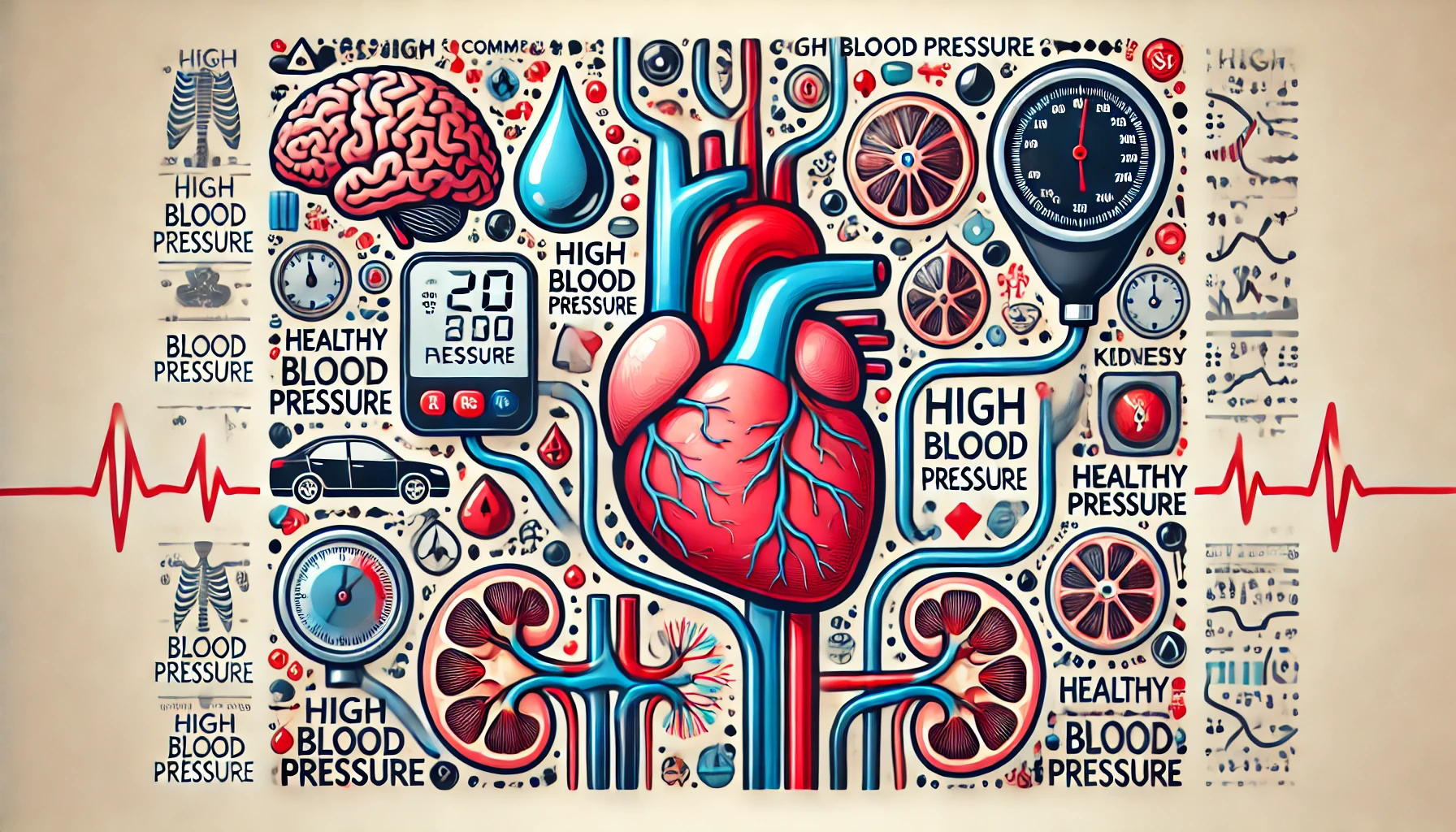La hipertensión arterial, comúnmente conocida como presión arterial alta, representa uno de los principales factores de riesgo para el desarrollo de enfermedades cardiovasculares en todo el mundo. Esta condición, a menudo silenciosa, puede pasar desapercibida durante largos períodos, lo que la convierte en un enemigo silencioso que, sin embargo, tiene consecuencias potencialmente graves. La gestión de la hipertensión requiere un enfoque multidisciplinario que combina tratamiento médico, cambios en el estilo de vida y, en particular, una alimentación equilibrada y nutritiva. En este contexto, la Revista Completa (revistacompleta.com) destaca que cada vez hay mayor evidencia que respalda el papel de ciertos frutos en la ayuda natural para disminuir la presión arterial, contribuyendo así a la salud cardiovascular.
Fundamentos científicos de la hipertensión arterial
La presión arterial es la fuerza que ejerce la sangre contra las paredes de las arterias a medida que el corazón la impulsa a través del sistema circulatorio. La medición de esta presión se realiza en dos números: la presión sistólica (la máxima cuando el corazón se contrae) y la diastólica (la mínima cuando el corazón está en reposo). Cuando estos valores se mantienen elevados de manera persistente, se habla de hipertensión arterial, condición que puede dañar los vasos sanguíneos, los órganos y aumentar la probabilidad de eventos adversos como infartos, accidentes cerebrovasculares, insuficiencia renal y demencia.
Clasificación y causas de la hipertensión
Hipertensión primaria o esencial
Es la forma más frecuente, representando aproximadamente el 90-95% de los casos. Se caracteriza por la existencia de una elevación sostenida de la presión arterial sin una causa identificable, aunque se relaciona con factores genéticos, hábitos alimenticios, sedentarismo, obesidad, consumo excesivo de alcohol y estrés.
Hipertensión secundaria
Representa una minoría de los casos y está vinculada a condiciones médicas específicas, como enfermedades renales, trastornos hormonales (como el hiperaldosteronismo o el feocromocitoma), uso de ciertos medicamentos o condiciones estructurales en los vasos sanguíneos.
Factores que influyen en la regulación de la presión arterial
El equilibrio de diversos nutrientes en la dieta, el estado de actividad física, el control del estrés y los hábitos de vida son fundamentales para mantener la presión arterial en niveles saludables. La interacción entre estos factores influye en la elasticidad de los vasos sanguíneos, la viscosidad de la sangre y la resistencia vascular periférica, aspectos que determinan directamente la presión arterial.
El papel de los nutrientes en la regulación de la presión arterial
Existen ciertos nutrientes que desempeñan un papel crítico en el control de la presión arterial, siendo los más destacados el potasio, el magnesio, la vitamina C y la fibra dietética. La ingesta adecuada de estos componentes ayuda a relajar las paredes arteriales, reducir la inflamación y mejorar la elasticidad vascular.
Potasio
El potasio ayuda a contrarrestar los efectos negativos del sodio, promoviendo la relajación de las paredes de los vasos sanguíneos y ayudando a eliminar el exceso de sodio a través de la orina. La ingesta recomendada para adultos es de aproximadamente 3,5 a 4,7 gramos diarios, dependiendo de las necesidades individuales.
Magnesio
Este mineral contribuye a la vasodilatación, favorece la función endotelial y ayuda a mantener una frecuencia cardíaca estable. La deficiencia de magnesio se ha asociado con un aumento en la presión arterial y mayor riesgo de hipertensión.
Vitamina C
Poderoso antioxidante que protege las paredes arteriales del daño oxidativo, la vitamina C también ayuda a reducir la inflamación y mejorar la función endotelial, aspectos esenciales para mantener una presión arterial saludable.
Fibra dietética
Se ha demostrado que una dieta rica en fibra, especialmente la soluble, ayuda a reducir los niveles de colesterol LDL y a mejorar la salud vascular, contribuyendo en consecuencia a la regulación de la presión arterial.
Frutas que contribuyen a reducir la presión arterial: un análisis detallado
El consumo de frutas, además de ser una estrategia placentera y accesible, aporta una fuente significativa de los nutrientes esenciales mencionados anteriormente. A continuación, se presenta un análisis exhaustivo de las frutas más efectivas y sus mecanismos de acción en la reducción de la hipertensión.
1. Bananas: un aliado en la lucha contra la hipertensión
Las bananas, conocidas por su alto contenido en potasio, representan uno de los alimentos más recomendados para quienes buscan controlar su presión arterial de manera natural. Cada banana madura contiene aproximadamente 400-450 mg de potasio, lo que ayuda en la dilatación de los vasos sanguíneos y en la eliminación del sodio en exceso, reduciendo así la resistencia vascular periférica.
Además, su contenido en fibra solubre y su bajo contenido en sodio favorecen la salud cardiovascular. Diversos estudios sugieren que el consumo diario de bananas puede disminuir significativamente los niveles de presión sistólica y diastólica, especialmente en personas con hipertensión leve o moderada.
Desde un punto de vista práctico, su versatilidad en la culinaria y su accesibilidad hacen que las bananas sean una opción ideal para incorporar en desayunos, snacks o postres saludables, complementando un estilo de vida orientado a la prevención y el control de la hipertensión.
2. Frutas del bosque: un potente arsenal antioxidante
Fresas, arándanos y frambuesas
Estas frutas no solo son deliciosas, sino que también contienen una elevada concentración de flavonoides, especialmente antocianinas, que tienen efectos vasodilatadores y antiinflamatorios. La acción de estos compuestos ayuda a mejorar la función endotelial, reducir la inflamación vascular y disminuir la resistencia vascular, contribuyendo a reducir la presión arterial.
El consumo regular de berries ha sido asociado con una disminución significativa de la presión arterial sistólica y diastólica en estudios clínicos. La vitamina C y la fibra presentes en ellas potencian estos efectos, además de fortalecer el sistema inmunológico y mejorar la salud general del corazón.
Se recomienda incluir estas frutas en la dieta diaria, ya sea en batidos, ensaladas o como snack, para aprovechar al máximo sus beneficios cardiovasculares.
3. Naranjas y cítricos: una fuente de vitamina C y flavonoides
Las naranjas y otros cítricos (pomelos, mandarinas, pomarrosas) contienen una alta concentración de vitamina C, que participa en la protección y reparación de las paredes arteriales, además de reducir la inflamación. La presencia de flavonoides, como hesperidina y naringenina, favorece la vasodilatación y la mejora de la circulación sanguínea.
El consumo de frutas enteras, en lugar de jugos procesados, garantiza una mayor ingesta de fibra, que ayuda a mantener niveles adecuados de colesterol y promueve una circulación saludable. Estudios recientes evidencian que la ingesta diaria de cítricos puede reducir en algunos casos la presión arterial en personas con hipertensión moderada.
4. Kiwis: un superalimento para la salud cardiovascular
El kiwi, con su perfil nutricional excepcional, destaca por su contenido en vitamina C, potasio, fibra y antioxidantes específicos como la luteína y la zeaxantina. La combinación de estos componentes ayuda a relajar los vasos sanguíneos, reducir la inflamación y proteger contra el estrés oxidativo, que son factores clave en la hipertensión.
Las investigaciones sugieren que el consumo regular de kiwis puede producir una reducción significativa en la presión arterial, especialmente en individuos con hipertensión leve. Además, su sabor agradable y su versatilidad en la preparación culinaria facilitan su incorporación en la dieta diaria.
5. Granada: un fruto con propiedades cardiovasculares incomparables
La granada se ha consolidado como un superalimento debido a su alto contenido en antioxidantes, especialmente punicalaginas y antocianinas. Estos compuestos no solo ayudan a reducir el estrés oxidativo, sino que también promueven la dilatación de los vasos sanguíneos y mejoran el flujo sanguíneo.
Estudios clínicos han demostrado que el consumo de jugo de granada o sus semillas puede disminuir significativamente la presión arterial en pacientes hipertensos, además de mejorar otros marcadores de salud cardiovascular.
6. Manzanas: la fruta de la salud cardiovascular
Las manzanas contienen una buena cantidad de fibra soluble, como la pectina, que ayuda a reducir el colesterol LDL y a mantener la salud arterial. Además, poseen compuestos antioxidantes, incluyendo flavonoides y quercetina, que reducen la inflamación y protegen los vasos sanguíneos.
Un consumo regular de manzanas se asocia con una menor incidencia de hipertensión y enfermedades cardiovasculares, siendo un alimento fácil de integrar en cualquier dieta.
7. Uvas: un remedio natural para la hipertensión
Las uvas, especialmente las variedades rojas y moradas, son ricas en resveratrol, un polifenol con efectos vasodilatadores y antiinflamatorios. La ingesta de uvas ayuda a mejorar la elasticidad vascular, reducir la inflamación y promover la salud cardíaca.
Su contenido en potasio y fibra también contribuye a reducir la presión arterial, haciendo de las uvas un snack saludable y efectivo para el control de la hipertensión.
8. Sandía: hidratación y salud vascular en un solo fruto
La sandía es muy conocida por su alto contenido en agua, lo que favorece la hidratación adecuada, fundamental para mantener la presión arterial en niveles normales. Además, contiene citrulina, aminoácido que contribuye a la vasodilatación y mejora de la circulación sanguínea.
Estudios recientes demuestran que el consumo regular de sandía puede disminuir la presión arterial, especialmente en personas con hipertensión leve, y además ayuda a reducir el riesgo de enfermedades cardiovasculares.
9. Aguacates: grasas saludables para el corazón
Los aguacates son ricos en grasas monoinsaturadas que ayudan a reducir los niveles de colesterol LDL y a mantener la salud vascular. Su elevado contenido en potasio también favorece la regulación de la presión arterial.
Además, el consumo de aguacate está asociado con una menor incidencia de hipertensión y enfermedades cardíacas, gracias a sus compuestos antioxidantes y su efecto en la mejora de la salud endotelial.
Tabla comparativa de los principales nutrientes en frutas para la hipertensión
| Fruta | Nutrientes destacados | Beneficios principales |
|---|---|---|
| Bananas | Potassium, fibra | Relaja vasos sanguíneos, regula líquidos |
| Berries (fresas, arándanos, frambuesas) | Antocianinas, vitamina C, fibra | Mejora función endotelial, reduce inflamación |
| Naranjas y cítricos | Vitamina C, flavonoides, fibra | Protege vasos sanguíneos, mejora circulación |
| Kiwis | Potassium, vitamina C, antioxidantes | Vasodilatación, reducción de presión |
| Granadas | Antioxidantes, punicalaginas | Reduce estrés oxidativo, mejora flujo sanguíneo |
| Manzanas | Fibra soluble, flavonoides | Reducción colesterol, protección vascular |
| Uvas | Resveratrol, potasio, fibra | Elasticidad vascular, reducción inflamatoria |
| Sandía | Citrulina, agua | Vasodilatación, hidratación |
| Aguacates | Grasas monoinsaturadas, potasio | Reducción colesterol, regulación presión |
Implicaciones prácticas y recomendaciones alimenticias
Incorporar estas frutas en la dieta diaria requiere planificación y conciencia, pero puede marcar una diferencia significativa en la gestión de la hipertensión. La clave está en la variedad y en la moderación, integrando estos frutos en comidas y meriendas habituales. La preparación puede variar desde ensaladas, batidos, postres saludables hasta consumo directo.
Es importante recordar que, si bien estos frutos aportan beneficios sustanciales, no sustituyen el tratamiento médico en casos de hipertensión severa. La consulta con profesionales de la salud es indispensable para definir un plan integral que incluya medicación, ejercicio, control del estrés y cambios en la alimentación.
Conclusión
La ciencia y la experiencia clínica respaldan que un consumo regular de ciertos frutos puede ser una estrategia efectiva y natural para reducir la presión arterial y mejorar la salud cardiovascular. La Revista Completa recomienda que, además de seguir las indicaciones médicas, las personas incorporen en su dieta frutas como bananas, berries, cítricos, kiwis, granadas, manzanas, uvas, sandía y aguacates, debido a su riqueza en nutrientes esenciales y compuestos bioactivos.
Complementar estos cambios con hábitos saludables, como la práctica regular de actividad física, la gestión del estrés y la reducción del consumo de sodio, puede prevenir y controlar la hipertensión de manera efectiva, contribuyendo a una mejor calidad de vida y un menor riesgo de complicaciones cardiovasculares.
Para un abordaje completo, siempre es recomendable consultar con profesionales de la salud y nutricionistas, quienes pueden personalizar las recomendaciones según las necesidades individuales. La prevención y el control de la hipertensión no solo dependen de medicamentos, sino también de decisiones conscientes y sostenibles en la alimentación y el estilo de vida.

